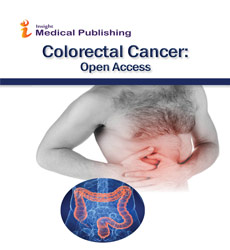Colorectal Cancer: Symptoms, Risk Factors, Diagnosis and Treatment
Nicole M. Saur
Department of Colorectal Surgery, University of Pennsylvania, Pennsylvania Hospital, Penn Medicine, Philadelphia, USA
- *Correspondence:
- Nicole M. Saur
Department of Colorectal Surgery, University of Pennsylvania,
Pennsylvania Hospital, Penn Medicine, Philadelphia, USA,
E-mail: SaurNM2013@163.com
Received date: July 06, 2020; Accepted date: July 20, 2020;; Published date: July 27, 2020
Citation: Nicole M. Saur (2020) Colorectal Cancer: Symptoms, Risk Factors, Diagnosis and Treatment. Colorec Cancer Vol.6 No.2:1.
Copyright: © 2020 Nicole M. Saur. This is an open-access article distributed under the terms of the Creative Commons Attribution License, which permits unrestricted use, distribution and reproduction in any medium, provided the original author and source are credited.
Editorial
Development of cancer from the parts of large intestine is called as colorectal cancer .It is also called as colon cancer or bowel cancer or rectal cancer. Colorectal cancer is the third most leading cause of cancer deaths in both men and women in the United States. Most of the cancer researchers have assumed that the spread of tumors rarely occurs later in the disease process. The general idea is that as tumors grow, the cancer cells accumulate more and more genetic changes. Some cells have the ability to move from primary tumor to the bloodstream or lymphatic system.
Signs and symptoms: Changes in bowel movements, Cramps and bloating, Blood in the stool, abdominal pain, unexplained weight loss, Fatigue, Shortness of breath.
Risk factors: A risk factor is anything that increases chance of developing cancer.
Age, Gender ,Family history of colorectal cancer, Rare inherited conditions, Inflammatory bowel disease, Adenomatous polyps, Personal history of certain types of cancers, Race, Physical inactivity and obesity, Nutrition, Smoking.
How colorectal cancer is diagnosed: An early diagnosis of colorectal cancer gives you more chances of curing it. Blood testing, Colonoscopy, X-ray, CT scan.
Treatment
Treatment depends on several factors like the size, location and the stage of the cancer and the current overall health condition of the patient. Different types of treatments are radiotherapy, chemotherapy and surgery.
Surgery for colorectal cancer: Surgery is the most common treatment. To reduce the risk of the cancer spreading the affected malignant tumors and nearby lymph nodes will be removed. This is a temporary measure, but it may be permanent if it is not able to join up the ends of the bowel. It will ease t.he symptoms, if surgery does not stop the cancer.
Chemotherapy: It is the commonly used treatment for colorectal cancer. Chemotherapy is nothing but giving a medicine or chemical to demolish the cancerous cells. It may help to shrink the tumor before surgery. Drugs that are using for colorectal cancer are bevacizumab Avastin and ramucirumab Cyramza.
Radiation therapy: Radiation therapy is, using high energy radiation beams to destroy the cancer cells and to prevent them from increasing. Radiation therapy and chemotherapy may be given after the surgery to help decreasing the chances of recurrence.
Ablation: Ablation can demolish a tumor without removing it. It can be carried out using radiofrequency, ethanol, or cryosurgery. These are delivered using a probe or needle that is guided by ultrasound or CT scanning technology.
Recovery: If malignant tumors are not treated they can spread to other parts of the body. The chances of getting the complete cure depend enormously on how early the cancer is diagnosed and treated.
Patient’s recovery depends on the following factors
Stage when diagnosis was made
Whether the cancer created any hole or blockage in the colon
The patient’s general state of health
In some cases, the cancer may return. It is estimated that 53,200 deaths (28,630 men and 24,570 women) are going to be attributed to colorectal cancer this year. Colorectal cancer is that the second leading explanation for cancer death within the use for men and ladies combined. It is the third leading explanation for cancer death in men and therefore the third leading explanation for cancer death in women.
When colorectal cancer is found early, it can often be cured. The death rate from this sort of cancer in 2017 was 54% but what it had been in 1970. This is due to improvements in treatment and increased screening, which finds colorectal changes before they turn cancerous and cancer at earlier stages. However, while death rates for adults over age 55 decreased by 2.6% each year from 2008 to 2017, they increased by 1% each year in adults under age 55. Currently, there are over 1 million colorectal cancer survivors in the United States.
Overall, the 5-year survival rate tells you what percent of people live at least 5 years after the cancer is found. Percent means how many out of 100. The 5-year survival rate for people with colorectal cancer is 64%. However, survival rates for colorectal cancer can vary supported several factors, particularly the stage.
Open Access Journals
- Aquaculture & Veterinary Science
- Chemistry & Chemical Sciences
- Clinical Sciences
- Engineering
- General Science
- Genetics & Molecular Biology
- Health Care & Nursing
- Immunology & Microbiology
- Materials Science
- Mathematics & Physics
- Medical Sciences
- Neurology & Psychiatry
- Oncology & Cancer Science
- Pharmaceutical Sciences
